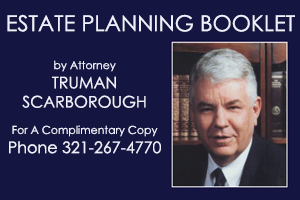What is Probate?
By Attorney Truman Scarborough
This is the fourth in a series of articles on the probate process in Florida. In the prior articles we have discussed “Formal Probate”, which is required if the decedent died within the last two years and the assets to be probated are valued at more than $75,000. In this article we will look at two shorter processes called “Summary Administration” and “Disposition of Personal Property Without Administration”.
When someone dies, assets titled just in the decedent’s name without beneficiaries are frozen. No one can sign the deceased person’s name on checks, deeds, etc. A Power of Attorney does not help since it is effective only while the creator is living. It is similar to an employer – employee relationship. If an employer goes out of business, there are no employees.
The process where property is transferred from the decedent’s name to beneficiaries is called probate. In “Formal Probate”, a legal entity (like a corporation) called the Probate Estate is created by the court to take the decedent’s place and hold the decedent’s assets. A Personal Representative (executor) is appointed to manage the estate. Step-by-step the Probate Court must be shown that everything is proceeding in accordance with the Florida Probate Code and Probate Rules. This includes publishing Notice to Creditors in the newspaper and waiting three months to see if any unknow creditors file claims. From the time pleadings are first filed with the court, it takes approximately six months to close the estate if everything runs smoothly.
In addition to Formal Probate, there is Summary Administration which is available when there are no creditors and the assets to be probated total less than $75,000. Two years after the date of death, creditors’ claims are barred and Summary Administration can be used regardless of the estate’s value. In this abbreviated process there is simply a petition to the court and a court order directing distribution of the assets to the specific beneficiaries.
One problem that we have encountered with Summary Administration is that financial institutions in other states at times do not honor a Florida Order of Summary Administration. Therefore, before filing anything with the court, we forward a copy of the proposed order to the financial institution to be sure they will comply with the Order.
Another possible concern with Summary Administration is that creditors (unless they are barred by the passage of two years from the decedent’s death) can seek payment directly from the recipients of the distribution.
When there is no real property, some small estates may qualify for a process called “Disposition of Personal Property Without Administration” which is designed to eliminate the need for an attorney. It may be utilized 1] where assets exempt from creditors (including household furniture, furnishings, and appliances in the decedent’s usual place of abode up to $20,000 in value and two motor vehicles) are going to the decedent’s spouse or children and 2] where non-exempt assets are used to pay up to $6,000 in medical expenses for the last 60 days of illness and funeral expenses. Information on this process and forms are available from the Brevard County Clerk’s office and on the Clerk’s web site.
In the next article, we will look at how the probate procedures differ depending on whether the decedent did or did not have a will.
For further information on estate planning you may be interested in Attorney Truman Scarborough’s Booklet on Estate Planning in Florida. It is available without charge or obligation by calling (321) 267 – 4770. His office is located at 239 Harrison Street, Titusville, Florida.


Recent Comments